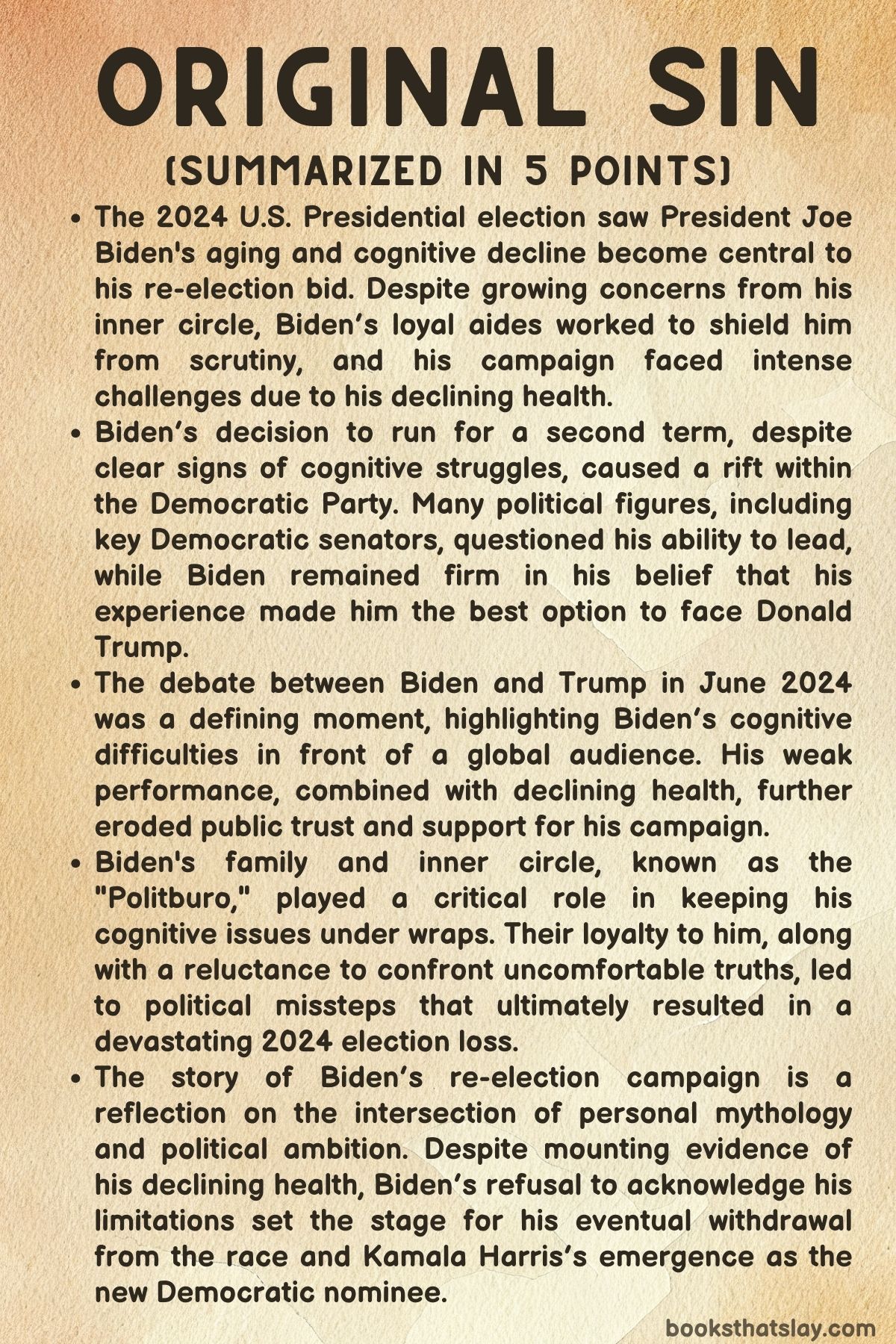Original Sin Summary and Analysis | Jake Tapper and Alex Thompson
Original Sin: President Biden’s Decline, Its Cover-Up, and His Disastrous Choice to Run Again by Jake Tapper and Alex Thompson explores the complex and turbulent final years of President Joe Biden’s political career as he faces both personal and professional challenges in the lead-up to the 2024 U. S. presidential election. The book offers an in-depth look into the deteriorating health of the president, particularly his cognitive and physical decline, which becomes a focal point during his re-election campaign.
As Biden grapples with age-related issues, his decision to run for a second term despite mounting evidence of his limitations sparks tensions within the Democratic Party. The book delves into the interplay of loyalty, denial, and political ambition, highlighting the internal struggles of Biden’s inner circle, the “Politburo,” as they try to protect his image and legacy.
Summary
In the months leading up to the 2024 U.S. presidential election, President Joe Biden and his team were forced to confront a growing crisis: his health. As Biden, now in his 80s, continued to show signs of physical and cognitive decline, his inner circle worked tirelessly to shield him from public scrutiny, even as signs of his struggles became increasingly evident.
Despite the mounting evidence that Biden’s abilities were deteriorating, he remained resolute in his decision to run for re-election, a decision that set the stage for a highly contentious and ultimately disastrous election cycle.
Biden’s cognitive decline was a central issue for his aides, family, and political allies. His once sharp mind was beginning to falter, as he frequently forgot names, stumbled over words, and struggled to maintain a coherent train of thought during speeches and public appearances.
These signs of decline were apparent to those who worked closely with him, yet Biden’s inner circle remained committed to shielding him from public criticism, often downplaying his condition or attributing his lapses to factors like stress or the demands of the office.
This loyalty to Biden, driven by a deep sense of political and personal loyalty, created a culture of denial within his administration.
As the election cycle progressed, Biden’s health issues began to play a larger role in the Democratic Party’s internal dynamics. There was a growing divide within the party about whether Biden should seek re-election given his age and the increasing signs of his physical and cognitive decline.
Some key figures within the party, including political strategist David Axelrod, began questioning whether it was in the best interest of the party for Biden to continue running. They feared that his health issues could undermine the party’s chances in the election, especially in a highly contested race against former President Donald Trump.
Despite these concerns, Biden remained steadfast in his decision to run. His personal narrative of resilience, built on overcoming personal tragedy and political setbacks, had become almost mythological to him and his loyal aides.
This mythos of Biden as a figure who had triumphed over adversity played a major role in his refusal to acknowledge his declining health. The president’s aides, many of whom had been with him for years, continued to defend his decision to run, emphasizing his political experience and the belief that he was the best candidate to defeat Trump once again.
However, as Biden’s campaign ramped up, the signs of his health issues became harder to ignore. During a crucial debate preparation session in June 2024, Biden’s cognitive struggles were laid bare.
His performance during mock debates was lackluster, with Biden often dozing off or struggling to stay focused. When debate night arrived, his performance was a disaster.
He appeared disoriented and struggled to articulate his policy positions. His responses were incoherent, and his failure to effectively counter Trump’s lies further damaged his credibility.
The debate, watched by millions of Americans, exposed Biden’s limitations in a way that could not be denied.
The aftermath of the debate was devastating for Biden’s campaign. The media and the public quickly picked up on the president’s struggles, and concerns about his ability to serve a second term grew louder.
Some Democratic lawmakers began publicly calling for Biden to step aside, arguing that the party needed a fresh candidate to take on Trump. Others, including key donors, expressed their doubts about Biden’s viability as a candidate.
Despite the mounting pressure, Biden remained determined to stay in the race. His inner circle, particularly his wife Jill, continued to support his decision, arguing that Biden’s experience and his ability to defeat Trump in the past made him the best choice for the party.
However, as Biden’s health continued to decline, it became increasingly difficult to ignore the reality of the situation. His voice grew weaker, his physical stamina diminished, and his ability to connect with voters waned.
His campaign struggled to regain momentum, and his public appearances became less frequent.
As the 2024 election drew closer, the tensions within the Democratic Party only grew. The party was divided between those who believed in Biden’s ability to overcome his health issues and those who felt it was time for him to step aside.
Vice President Kamala Harris, who had long been loyal to Biden, found herself in a difficult position. She was poised to step into the role of the Democratic nominee after Biden’s eventual withdrawal from the race, but her own campaign struggled to gain traction.
Harris’s transition from vice president to presidential candidate was complicated by the need to appeal to a divided party while also distancing herself from Biden’s legacy.
In the final months of the election cycle, Biden’s health continued to deteriorate. He contracted COVID-19, which further highlighted his physical frailty.
Meanwhile, public confidence in his ability to lead continued to erode. Despite the growing concerns, Biden’s team continued to protect his image, often limiting his public appearances and relying on carefully curated campaign videos.
However, the damage had already been done. Biden’s refusal to address his health concerns head-on created a sense of distrust within the party, and many Democrats feared that his candidacy could lead to a devastating loss.
Biden’s decision to withdraw from the race came too late to reverse the damage that had been done. With Kamala Harris taking over as the Democratic nominee, the party had to scramble to adjust its strategy for the remaining months of the campaign.
The 2024 election became a referendum not just on the candidates themselves, but on the broader issue of presidential fitness and the political dynamics surrounding aging leadership.
In the end, Biden’s decision to run for re-election despite his declining health had disastrous consequences for the Democratic Party. The failure to confront the reality of his condition led to a chaotic election cycle, with the party ultimately suffering a crushing loss to Donald Trump.
The book serves as a stark reminder of the dangers of loyalty, denial, and political ambition, and the high stakes of leadership in an aging democracy.

Key People
Joe Biden
In Original Sin, Joe Biden is depicted as a complex figure who embodies both resilience and vulnerability, particularly in his battle with aging and cognitive decline. As the incumbent president during the 2024 U.S. presidential election, Biden’s long-standing reputation as a fighter and survivor shapes much of his decisions and actions.
His political mythos, which has been built around his overcoming personal tragedies, becomes a source of both strength and denial. Biden’s refusal to acknowledge his diminishing cognitive abilities is a critical aspect of his character, driven by his personal narrative of resilience.
His aides and family, particularly his wife Jill Biden, continue to protect him from the harsh reality of his health, shielding him from both public scrutiny and private concerns. Despite mounting signs of physical and cognitive decline, including memory lapses and poor debate performances, Biden’s stubbornness in running for re-election is rooted in his deep belief in his own myth and his inability to step aside.
His leadership, marked by a lack of self-awareness and refusal to confront his limitations, ultimately leads to political disaster. His personal journey is tragic—what once made him a symbol of triumph now becomes the catalyst for his downfall.
Kamala Harris
Kamala Harris plays a significant but complex role in the unfolding events of Original Sin. As Vice President, she finds herself in a difficult position throughout the 2024 election, caught between her loyalty to President Biden and the growing doubts surrounding his ability to run for a second term.
Her campaign for re-election becomes a symbol of her own political ambition, but it is overshadowed by the chaotic situation caused by Biden’s refusal to step down. Harris is loyal and enthusiastic, but she is also realistic about the challenges she faces, having limited time to prepare after Biden’s late withdrawal.
The strained relationship between Biden and Harris is emblematic of the broader divide within the Democratic Party, where the personal loyalty to Biden and the necessity of transition collide. Her candidacy, while born from a sense of duty, is burdened by the weight of an inherited and fractured political landscape.
Harris is left trying to unify the party and step into a role she hadn’t fully prepared for, managing expectations while navigating a turbulent and hostile political environment.
Jill Biden
Jill Biden emerges as a crucial figure in Original Sin, not only as the First Lady but also as a steadfast protector of her husband, Joe Biden. Throughout the narrative, she is depicted as one of the few people in Biden’s inner circle who continues to shield him from the painful truths of his cognitive decline.
Her deep loyalty to Biden leads her to support his decision to run for re-election despite clear signs that his health is deteriorating. Her role goes beyond that of a supportive spouse; she acts as a political strategist within the campaign, fiercely defending Biden’s candidacy in the face of increasing doubt.
Jill Biden’s actions, while motivated by love and devotion, are also politically charged, as she seeks to maintain the Biden legacy, even as the public and party insiders grow increasingly concerned about his fitness for office. Her dedication to protecting her husband’s image, and her insistence on downplaying his cognitive issues, ultimately contributes to the political crisis that unfolds.
The “Politburo”
The “Politburo,” as it is colloquially referred to in Original Sin, consists of Biden’s closest aides and advisers who form an insular group, often acting as gatekeepers to the president. This small circle of loyalists works tirelessly to manage Biden’s image and protect him from the harsh reality of his declining health.
They are characterized by an unwavering loyalty to Biden, even when this leads them to suppress uncomfortable truths about his cognitive decline. This group’s denial about the severity of Biden’s condition contributes to the internal struggles within the Democratic Party.
The aides’ actions, driven by a sense of duty to Biden, form the crux of the narrative’s exploration of political loyalty and the tension between personal allegiance and political responsibility. Their collective refusal to confront Biden’s vulnerabilities becomes a tragic element in the story, as their denial enables the political disaster that ensues in 2024.
Barack Obama
In Original Sin, Barack Obama plays a pivotal but indirect role in shaping the direction of the 2024 election. While Obama’s leadership has already passed, his influence remains strong within the Democratic Party.
As the former president, Obama is portrayed as privately questioning Biden’s ability to lead effectively in the upcoming election. His discussions with key Democratic figures, such as Chuck Schumer and Nancy Pelosi, suggest that he is increasingly convinced that Biden’s time has passed.
Obama’s concerns about Biden’s cognitive and physical decline, coupled with his recognition of the rising need for a fresh candidate, reveal the rift within the Democratic Party regarding Biden’s re-election bid. Obama’s influence as a political figure is undeniable, and his reflections on Biden’s situation serve as a critical commentary on the intersection of loyalty and political pragmatism.
Democratic Senators and Party Leaders
Various Democratic senators and party leaders are critical voices within Original Sin, as they represent the growing concerns about Biden’s fitness for office. Figures like Sheldon Whitehouse, Chris Coons, and others express doubts about Biden’s ability to effectively serve a second term, particularly after his underwhelming debate performance.
Their concerns reflect a broader divide within the party, where loyalty to Biden clashes with the pragmatic need for a candidate who can win against Donald Trump. These leaders serve as the voice of reason and caution, yet they remain largely sidelined as Biden’s refusal to acknowledge his weaknesses dominates the narrative.
Their struggle to balance loyalty to the president with the party’s long-term prospects highlights the complex dynamics at play during this tumultuous election cycle.
Hunter Biden
Hunter Biden, the son of President Joe Biden, adds a layer of personal complexity to the narrative in Original Sin. His legal troubles and the public scrutiny surrounding his business dealings and personal life become a significant burden on the Biden family’s public image.
The narrative touches on how Hunter’s issues, including his legal investigations and personal struggles, intersect with the broader political challenges Biden faces. Hunter’s problems, while separate from Biden’s health issues, are nevertheless intertwined with the political crisis, adding to the stress and scrutiny the family experiences.
Biden’s decision to pardon his son, while a personal and family-driven choice, raises questions about his judgment and the consequences of family loyalty in the political realm. Hunter’s presence in the story, though not central, amplifies the personal stakes and challenges the Bidens face in the public eye.
Analysis of Themes
Age and Health Decline
The decline of Joe Biden’s physical and cognitive health plays a central role in the political and personal challenges he faces leading up to the 2024 U. S.
Presidential election. The narrative depicts how his aging process and mental deterioration become undeniable, yet Biden’s inner circle, including his wife Jill and loyal aides, shield him from public scrutiny.
Despite the obvious signs of his diminishing abilities, such as forgetting names, losing his train of thought, and making verbal gaffes, his team is reluctant to address the issue, continuing to project an image of competence and resilience. Biden’s aging health is not just a personal matter but a political issue, as it impacts his ability to engage with the public and deliver effective leadership.
In a world where the physical and cognitive capacities of a president are under constant scrutiny, Biden’s decline raises questions about his ability to lead in a second term. The tension between loyalty to Biden and the uncomfortable reality of his deteriorating health illustrates how his aides and family navigate the delicate balance of shielding him from criticism while trying to maintain the Democratic Party’s prospects in a fiercely contested election.
Biden’s failure to confront these health challenges head-on ultimately contributes to his struggles in the 2024 campaign, culminating in the collapse of his candidacy and a disastrous election result.
Loyalty vs. Truth
The theme of loyalty versus truth emerges as a powerful undercurrent in Biden’s 2024 campaign, with his inner circle and family prioritizing loyalty to the president over confronting uncomfortable truths about his health. This blind loyalty becomes a double-edged sword, as aides and family members, including Jill Biden, protect the image of Biden at the expense of transparency.
Despite mounting evidence that Biden’s cognitive abilities are declining, those closest to him continue to push the narrative of his resilience and competence, refusing to acknowledge the reality of his physical and mental limitations. This refusal to face the truth creates a toxic environment of denial, where the president’s health is downplayed and political decisions are made with the belief that Biden can still lead despite clear signs to the contrary.
The consequences of this dynamic become evident when Biden’s performance in critical moments, such as the debate with Donald Trump, showcases his inability to articulate coherent arguments or respond effectively. This theme also underscores the danger of placing loyalty above honesty, as Biden’s inner circle inadvertently fuels his political downfall by avoiding an honest conversation about his fitness for office.
The rift between the personal loyalty to Biden and the professional duty to protect the party’s future becomes a central conflict in the Democratic Party’s internal struggle during the 2024 election.
The Burden of Mythos
Biden’s personal mythology, shaped by decades of overcoming adversity and personal tragedy, becomes both a driving force and a hindrance in his decision to run for re-election. For Biden and his closest aides, his narrative of resilience—marked by personal losses such as the death of his wife and son—becomes a cornerstone of his political identity.
This mythos, however, becomes a prison that prevents him from acknowledging his own limitations. His aides, deeply loyal to the president’s narrative, encourage him to stay in the race, not only because they believe in his political acumen but because they view him as the embodiment of a personal and political journey defined by survival and perseverance.
However, this mythos becomes increasingly problematic as Biden’s cognitive decline becomes harder to ignore. The tension between Biden’s personal mythology and the stark reality of his physical and mental decline highlights the complexities of leadership and the human desire to hold on to power even when the circumstances are no longer conducive to success.
The insistence on maintaining this mythology prevents candid discussions about Biden’s health and leads to significant missteps, including a disastrous debate performance and a general inability to connect with voters. The failure to reconcile the myth of Biden’s resilience with the reality of his decline becomes a key element in the political fallout of the 2024 election.
The Collapse of Democratic Unity
The 2024 election highlights a growing fracture within the Democratic Party, with Biden’s re-election bid deepening divisions between different factions of the party. While Biden’s inner circle remains staunchly loyal, others within the party begin to question his ability to continue as the presidential candidate.
This internal conflict becomes especially pronounced after Biden’s disastrous debate performance, which exposes his cognitive decline to a wider audience. The tension within the party grows as some members argue for Biden to step down, with figures like David Axelrod and even former President Barack Obama privately acknowledging that Biden’s ability to lead is in serious doubt.
These concerns are compounded by Biden’s reluctance to address his health publicly, and as his condition worsens, so does his standing within the party. His refusal to step aside despite clear signs of his diminishing abilities causes a growing sense of frustration, particularly among those who believe that a fresh candidate could have a better chance against Donald Trump.
The lack of unity within the Democratic Party becomes a central issue, as the party faces the dual challenges of Biden’s health and the emergence of Kamala Harris as a candidate who must navigate the delicate balance of supporting Biden while preparing for the possibility of stepping into his role. The fractured party, unable to unite behind a single candidate, sets the stage for a disastrous election outcome.
Political Ambition and Personal Consequences
At the heart of Biden’s re-election campaign is the clash between political ambition and the personal consequences of his declining health. Despite clear indications that his physical and cognitive abilities are deteriorating, Biden’s ambition and the political culture surrounding him push him to continue his bid for a second term.
The text demonstrates how Biden’s deep desire to continue leading, driven by a sense of duty and a personal narrative of overcoming adversity, overrides the more practical considerations of his health and the party’s future. His refusal to step down not only puts his own health at risk but also jeopardizes the Democratic Party’s chances in the 2024 election.
This theme explores the high stakes of personal ambition in the realm of politics, where the line between personal responsibility and political duty becomes blurred. Biden’s failure to acknowledge his limitations and step aside, despite the mounting pressure, reveals the personal toll that political ambition can take.
In this case, Biden’s ambition becomes a catalyst for his downfall, as it blinds him to the realities of his health and the consequences of his actions on the party and the nation. Ultimately, his political ambition leads to personal and political catastrophe, as the Democratic Party faces a difficult road to recovery after his failed campaign.


